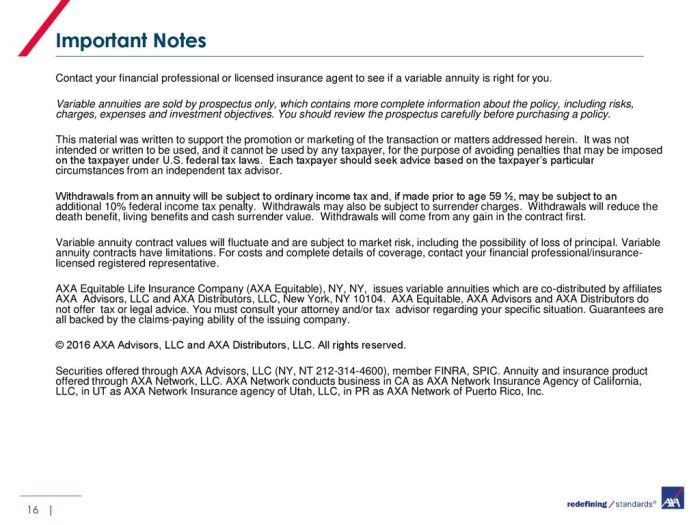A domestic insurer issuing variable contracts plays a significant role in the financial landscape, offering investment opportunities tailored to specific needs. This comprehensive overview delves into the regulatory framework, types of contracts, investment options, and risks associated with these specialized insurance policies.
Domestic insurers, operating within a defined jurisdiction, provide variable contracts that differ from traditional insurance policies by offering investment options linked to market performance. Understanding the intricacies of these contracts empowers investors to make informed decisions.
Domestic Insurer Issuing Variable Contracts: A Domestic Insurer Issuing Variable Contracts

Domestic insurers issuing variable contracts play a crucial role in providing financial protection and investment opportunities to individuals. These insurers offer specialized insurance policies that allow policyholders to invest in a range of underlying investment options, potentially generating returns over time.
Define a Domestic Insurer Issuing Variable Contracts
In the context of insurance, a domestic insurer refers to an insurance company that is domiciled and licensed to operate within a specific country or jurisdiction. Domestic insurers are subject to the laws and regulations of their home country, ensuring compliance with financial and consumer protection standards.
Variable contracts are a type of insurance policy that provides a combination of insurance coverage and investment options. Unlike traditional insurance policies, which offer fixed payouts or benefits, variable contracts link the policyholder’s returns to the performance of underlying investment portfolios.
Regulatory Framework for Domestic Insurers Issuing Variable Contracts
Domestic insurers issuing variable contracts are subject to a comprehensive regulatory framework aimed at protecting policyholders and ensuring financial stability. These regulations include:
- Solvency regulations: These regulations ensure that insurers maintain adequate financial reserves to meet their obligations to policyholders.
- Investment restrictions: Regulators impose limits on the types of investments that insurers can make within variable contracts, reducing risk and protecting policyholder funds.
- Disclosure requirements: Insurers are required to provide clear and concise information to policyholders about the risks and potential rewards associated with variable contracts.
Types of Variable Contracts Offered
Domestic insurers offer a variety of variable contracts tailored to different investment goals and risk tolerances. Some common types include:
- Variable annuities: These contracts provide retirement income and investment opportunities, with policyholders choosing from a range of investment options within the contract.
- Variable universal life insurance: This type of policy combines life insurance coverage with a cash value account that grows based on the performance of underlying investments.
- Variable endowment contracts: These contracts provide a lump sum payment at the end of a specified period, with the value of the contract linked to the performance of investments.
Investment Options within Variable Contracts, A domestic insurer issuing variable contracts
Variable contracts typically offer a wide range of investment options, allowing policyholders to customize their portfolios based on their individual risk tolerance and investment goals. These options may include:
- Stocks: Shares of publicly traded companies, offering the potential for capital appreciation but also carrying higher risk.
- Bonds: Debt securities issued by governments and corporations, providing fixed income payments and generally lower risk.
- Mutual funds: Pooled investment funds that invest in a diversified portfolio of stocks, bonds, or other assets.
Risks Associated with Variable Contracts
While variable contracts offer the potential for investment growth, they also carry certain risks that investors should be aware of:
- Market risk: The value of variable contracts is directly linked to the performance of the underlying investments, which can fluctuate in value.
- Insurance risk: Variable contracts may not provide the same level of protection as traditional insurance policies, as the policyholder bears the investment risk.
- Liquidity risk: Withdrawals from variable contracts may be subject to restrictions or penalties, limiting access to funds when needed.
Sales and Distribution of Variable Contracts
Domestic insurers typically sell and distribute variable contracts through a variety of channels, including:
- Insurance agents: Licensed professionals who provide guidance and assistance to potential investors.
- Financial advisors: Registered individuals who provide personalized investment advice and portfolio management services.
- Online platforms: Some insurers offer the ability to purchase variable contracts directly through their websites.
Tax Implications of Variable Contracts
The tax treatment of variable contracts can vary depending on the type of contract and the underlying investments. Generally:
- Earnings within variable contracts are tax-deferred, meaning they are not taxed until withdrawn.
- Withdrawals from variable contracts may be subject to ordinary income tax or capital gains tax, depending on the type of investment and the length of time it was held.
Comparison with Other Investment Vehicles
Variable contracts can be compared to other investment vehicles such as mutual funds and annuities:
- Mutual funds: Variable contracts offer a wider range of investment options than mutual funds, but they also carry higher investment risk.
- Annuities: Annuities provide a guaranteed income stream, while variable contracts offer the potential for higher returns but also carry market risk.
Query Resolution
What is the key difference between variable contracts and traditional insurance policies?
Variable contracts offer investment options linked to market performance, while traditional insurance policies provide fixed payouts or coverage.
Who regulates domestic insurers issuing variable contracts?
Regulatory bodies in each jurisdiction oversee the operations of domestic insurers, ensuring compliance with relevant laws and regulations.
What are the potential risks associated with investing in variable contracts?
Variable contracts are subject to market fluctuations, which can lead to potential losses. Understanding the risk profile and implementing appropriate risk management strategies is essential.



